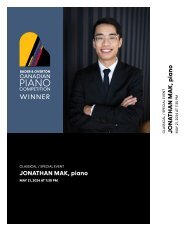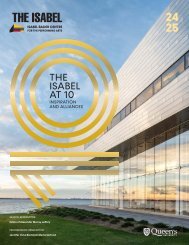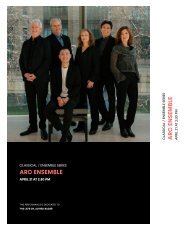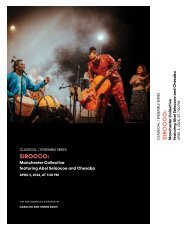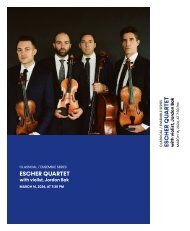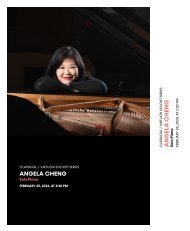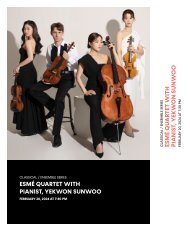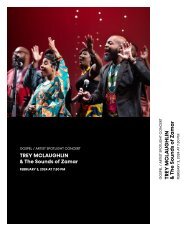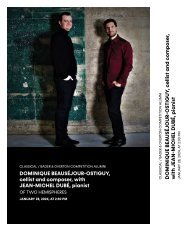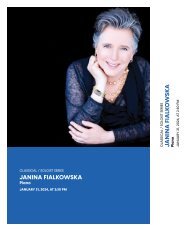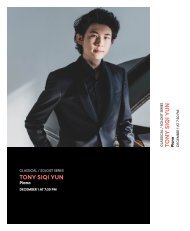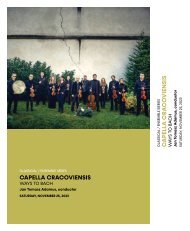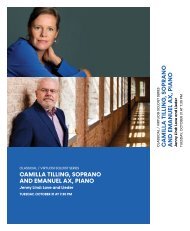Create successful ePaper yourself
Turn your PDF publications into a flip-book with our unique Google optimized e-Paper software.
CLASSICAL / ARTIST SPOTLIGHT CONCERT<br />
GRYPHON TRIO<br />
<strong>with</strong> <strong>James</strong> <strong>Campbell</strong>, clarinet<br />
APRIL <strong>10</strong> AT 7:30 PM<br />
CLASSICAL / ARTIST SPOTLIGHT CONCERT<br />
GRYPHON TRIO<br />
<strong>with</strong> <strong>James</strong> <strong>Campbell</strong>, clarinet<br />
APRIL <strong>10</strong> AT 7:30 PM<br />
THIS PERFORMANCE IS SUPPORTED BY<br />
THE SHELAGH AND DAVID WILLIAMS<br />
MUSIC PROGRAMMING FUND
GRYPHON TRIO<br />
<strong>with</strong> <strong>James</strong> <strong>Campbell</strong>, clarinet<br />
MESSIAEN:<br />
QUARTET FOR<br />
THE END OF TIME<br />
<strong>James</strong> <strong>Campbell</strong>, clarinet<br />
Annalee Patipatanakoon, violin<br />
Roman Borys, cello<br />
Jamie Parker, piano<br />
PROGRAM<br />
BEETHOVEN<br />
BERNSTEIN<br />
<strong>Trio</strong> in B-Flat Major, Op. 11, for clarinet, cello and piano<br />
Allegro con brio<br />
Adagio<br />
Tema con variazioni — Allegretto<br />
Sonata for <strong>Clarinet</strong> and Piano<br />
Grazioso<br />
Andantino — Vivace e leggiero<br />
INTERMISSION<br />
MESSIAEN<br />
<strong>Quartet</strong> for the End of Time<br />
1. Crystal liturgy [quartet]<br />
2. Vocalise, for the Angel who announces the end of time [quartet]<br />
3. Abyss of birds [solo clarinet]<br />
4. Interlude [trio <strong>with</strong>out piano]<br />
5. Praise to the eternity of Jesus [cello and piano]<br />
6. Dance of fury, for the seven trumpets [quartet in unison]<br />
7. Tangle of rainbows, for the Angel who announces the end of time [quartet]<br />
8. Praise to the immortality of Jesus [violin and piano]
ABOUT TONIGHT’S PERFORMANCE<br />
The Opus 11 <strong>Trio</strong> by Ludwig van Beethoven<br />
(1770-1827) is scored <strong>with</strong> a clarinet replacing<br />
the violin, imbuing the work <strong>with</strong> a more lyrical<br />
and lighter character than the three Piano <strong>Trio</strong>s<br />
of Beethoven’s Opus 1. This lyrical quality is<br />
particularly noticeable in the last movement’s<br />
set of nine variations on a song from an opera<br />
buffa by Joseph Weigl. You will know when the<br />
final variation arrives, as the piano presents this<br />
earworm-like theme in loud canonic octaves<br />
between the two hands, <strong>with</strong> this passage then<br />
echoed in the clarinet and cello. Rather humorously<br />
at this point, the piano gets stuck on a trill before<br />
sliding unexpectedly to G major. The quick return<br />
to B-flat major arrives <strong>with</strong> a syncopated 6/8<br />
meter reworking of the theme that dances to<br />
the double bar line.<br />
Leonard Bernstein (1918-1990) had an impressive<br />
career as both a composer and a conductor, being<br />
equally successful at writing concert music and<br />
Broadway musicals and leading the New York<br />
Philharmonic from 1958-72. His only <strong>Clarinet</strong> Sonata<br />
was written at the age of twenty-four, just a year<br />
after the première of <strong>Messiaen</strong>’s <strong>Quartet</strong> for the<br />
End of Time. The Sonata’s compact two-movement<br />
design displays many of the characteristics of<br />
Bernstein’s compositional voice, <strong>with</strong> the first<br />
movement having a somewhat serious neoclassical<br />
quality, while the syncopated meters of the second<br />
movement’s Vivace produce a jazz-like energy<br />
and sparkle. The brief slow introduction to<br />
the second movement is reintroduced in the<br />
middle of the Vivace <strong>with</strong> a more florid and<br />
expressive treatment.<br />
French composer Olivier <strong>Messiaen</strong> (1908-1992)<br />
is recognized as one of the 20th century’s major<br />
composers, creating a distinctive style that<br />
embraces novel approaches to rhythm, pitch,<br />
harmony and birdsong, all of which can be heard<br />
in his seminal work, <strong>Quartet</strong> for the End of Time.<br />
A proficient organist, <strong>Messiaen</strong>’s large body<br />
of music for that instrument often draws upon<br />
biblical influences. In a similar fashion, the Book of<br />
Revelation’s description of the Apocalypse became<br />
the springboard for the very descriptive movement<br />
titles of the <strong>Quartet</strong> for the End of Time. Given the<br />
work’s rather complex treatment of musical ideas<br />
and texture, perhaps the best preparation for an<br />
audience member unfamiliar <strong>with</strong> the piece, is to<br />
simply summarize the historical background behind<br />
the work’s genesis and premiere. At the start of<br />
World War II, while serving in the medical service<br />
of the French Army, <strong>Messiaen</strong> was captured by the<br />
Germans and interned in a prisoner-of-war camp.<br />
Meeting a violinist and cellist, he started working<br />
on a piano trio which eventually became this<br />
quartet, which helps explain why only four of the<br />
eight movements are scored for the full ensemble.<br />
Knowing that this work was first performed in<br />
January 1941 to an audience of prisoners and<br />
prison guards, <strong>with</strong> the composer playing a<br />
poorly maintained upright piano and the other<br />
performers using similarly salvaged instruments,<br />
is to appreciate the profound spirituality of the<br />
music and to recognize the human need to create<br />
art and something of lasting beauty even under<br />
circumstances of confinement and duress.<br />
©<strong>2024</strong> by John Burge for the Isabel<br />
ABOUT THE GRYPHON TRIO<br />
The <strong>Gryphon</strong> <strong>Trio</strong> is firmly established as one of<br />
the world’s preeminent piano trios. For more than<br />
25 years, it has earned acclaim for and impressed<br />
international audiences <strong>with</strong> its highly refined,<br />
dynamic, and memorable performances. The <strong>Trio</strong>’s<br />
repertoire ranges from traditional to contemporary,<br />
and from European classicism to modern-day<br />
multimedia. It is committed to redefining chamber<br />
music for the 21st century.<br />
Violinist Annalee Patipatanakoon, cellist Roman<br />
Borys, and pianist Jamie Parker are creative<br />
innovators <strong>with</strong> an appetite for discovery and<br />
new ideas. They have commissioned over 85 new<br />
works, and they frequently collaborate <strong>with</strong> other<br />
artists on projects that push the boundaries of<br />
Classical music.<br />
The <strong>Trio</strong> tours regularly throughout North America<br />
and Europe. It enjoys longstanding relationships<br />
<strong>with</strong> prominent festivals and arts incubators like<br />
Banff Centre for Arts and Creativity, Orford Music<br />
Academy, Music Toronto, Ottawa Chamberfest,<br />
and Festival del Lago International Academy of<br />
Music in Ajijic, Mexico. <strong>Gryphon</strong> <strong>Trio</strong> often performs<br />
triple concerti <strong>with</strong> the world’s major symphony<br />
orchestras and smaller chamber orchestras.<br />
The <strong>Gryphon</strong> <strong>Trio</strong>’s prolific recording catalogue<br />
includes 22 releases on Analekta, Naxos, and other
labels; it is an encyclopaedia of works for the genre.<br />
Honours include 11 nominations and three Juno<br />
Awards for Classical Album of the Year in 2004,<br />
2011, and most recently in 2019. In 2013, Canada<br />
Council for the Arts presented <strong>Gryphon</strong> <strong>Trio</strong> <strong>with</strong><br />
the prestigious Walter Carsen Prize for Excellence<br />
in the Performing Arts.<br />
The <strong>Gryphon</strong>s are deeply committed to community<br />
engagement, education, and the development<br />
of next-generation audiences and performers.<br />
They conduct masterclasses and workshops<br />
at universities and conservatories. They are<br />
ensemble-in-residence at the Isabel Bader Centre<br />
for the Performing Arts in Kingston, Ontario, and<br />
artists-in-residence at Trinity College, University<br />
of Toronto. Since 20<strong>10</strong>, the <strong>Trio</strong>’s ground-breaking<br />
outreach program, Listen Up!, has inspired 16<br />
Canadian communities to collaborate on large-scale<br />
multifaceted arts creation projects. The <strong>Trio</strong> leads<br />
Orford Music Academy’s Piano <strong>Trio</strong> Workshop and<br />
directs the Classical Music Summer <strong>Program</strong>s at<br />
Banff Centre for Arts and Creativity.<br />
From 2007 to 2020, Roman Borys was Artistic<br />
Director of the Ottawa Chamber Music Society;<br />
Annalee Patipatanakoon and Jamie Parker served<br />
as OCMS’ Artistic Advisors. Mr. Parker is the<br />
Rupert E. Edwards Chair in Piano Performance<br />
at the University of Toronto Faculty of Music. Ms.<br />
Patipatanakoon is Associate Professor of Violin<br />
and Performance Area Chair of Strings.<br />
ABOUT JAMES<br />
CAMPBELL, CLARINET<br />
<strong>James</strong> <strong>Campbell</strong> has<br />
followed his muse to five<br />
television specials, more<br />
than 40 recordings, over<br />
30 works commissioned, a<br />
Juno Award (Stolen Gems),<br />
a Roy Thomson Hall Award, Canada’s Artist of<br />
the Year, the Queen’s Golden Jubilee Medal and<br />
Canada’s highest honor, the Order of Canada.<br />
Called by the Toronto Star “Canada’s pre-eminent<br />
clarinetist and wind soloist,” <strong>James</strong> <strong>Campbell</strong> has<br />
performed solo and chamber music concerts in 30<br />
countries in many of the worlds great concert halls:<br />
London’s Wigmore and Queen Elizabeth Halls,<br />
Amsterdam’s Concertgebouw, Tokyo’s Suntory<br />
Hall, Paris’s Theatre Champs-Elysees, Washington’s<br />
Kennedy Centre and Symphony Hall, Boston. He<br />
has been soloist <strong>with</strong> over 60 orchestras, including<br />
the Boston Pops, the London Symphony, the<br />
London Philharmonic, the Russian Philharmonic,<br />
and the Montreal Symphony, and has performed<br />
Copland’s <strong>Clarinet</strong> Concerto four times <strong>with</strong> Aaron<br />
Copland conducting. He has appeared <strong>with</strong> over<br />
30 string quartets, including the Amadeus (when<br />
he replaced an ailing Benny Goodman on a tour of<br />
California), Guarneri, Vermeer, New Zealand, Fine<br />
Arts, Allegri and St Lawrence <strong>Quartet</strong>s.<br />
Of <strong>Campbell</strong>’s extensive discography many<br />
recordings have won international acclaim. His<br />
recording of the Brahms <strong>Clarinet</strong> Quintet <strong>with</strong><br />
the Allegri <strong>Quartet</strong> was voted “Top Choice” by<br />
BBC Radio 3 and the London Times, and “Stolen<br />
Gems,” a recording of lighter classics, won a Juno<br />
Award (Canada’s Grammy). <strong>James</strong> has recorded<br />
the world premiere recording of Brahms Sonata<br />
Op. 120 No. 1, orchestrated by Luciano Berio,<br />
and Weber Concerto No. 1, <strong>with</strong> the London<br />
Symphony, Debussy’s Premiere Rhapsody <strong>with</strong><br />
the Philharmonia, Saint-Saëns Tarantella <strong>with</strong> the<br />
London Philharmonic, and Mozart and Copland<br />
Concertos <strong>with</strong> the NACO. Sony Classical has<br />
recently re-released his recording of the Debussy<br />
Premier Rhapsody <strong>with</strong> Glenn Gould.<br />
Since 1985, <strong>James</strong> <strong>Campbell</strong> has been Artistic<br />
Director of the Festival of the Sound, the annual<br />
summer Canadian chamber music festival, and has<br />
programmed over 1300 concerts for the festival.<br />
Under his direction the Festival has traveled<br />
to England, Japan, and the Netherlands and it<br />
has been the subject of documentaries by BBC<br />
Television, CBC Television and TV Ontario.<br />
<strong>Campbell</strong> is the subject of numerous features<br />
and cover stories in <strong>Clarinet</strong> Magazine (USA),<br />
<strong>Clarinet</strong> and Sax (UK), Piper Magazine (Japan),<br />
Gramophone, and in the book <strong>Clarinet</strong> Virtuosi<br />
of Today, by British author and clarinet authority<br />
Pamela Weston.<br />
<strong>James</strong> continues to explore and expand musically,<br />
his most recent collaboration being Spirit ‘20,<br />
created at Festival of the Sound in, 20<strong>10</strong>. The<br />
six-member ensemble explores the music of the<br />
roaring 20’s in new and innovative ways.<br />
<strong>James</strong> <strong>Campbell</strong> has been Professor of Music at<br />
the prestigious Jacobs School of Music, Indiana<br />
University since 1988.





